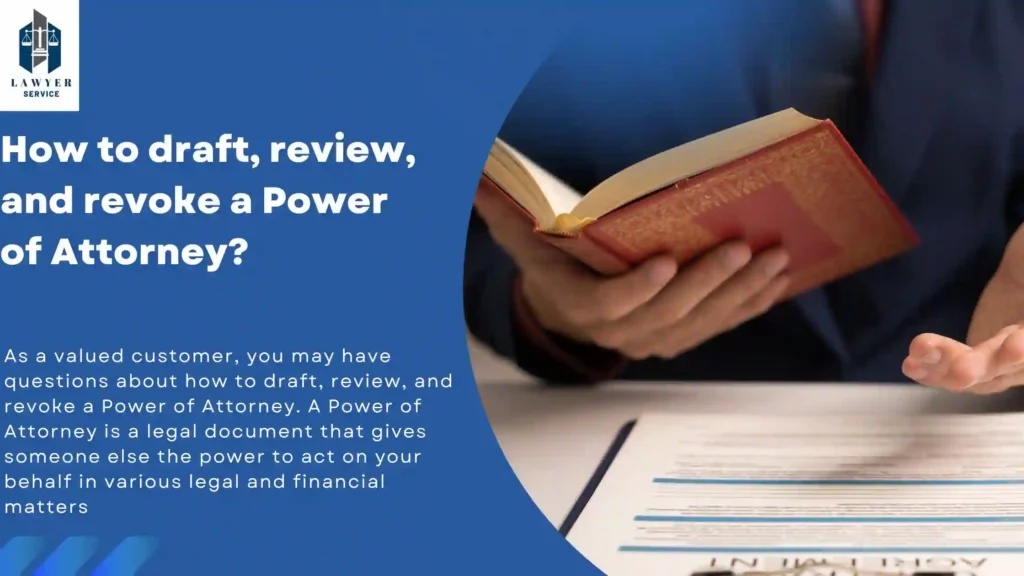
How to draft review and revoke a Power of Attorney
How to draft review and revoke a Power of Attorney As a valued customer, you may have questions about how to draft, review, and revoke a Power of Attorney. A Power of Attorney is a legal document that gives someone else the power to act on your behalf in various legal and financial matters. It can be a useful tool for managing your affairs if you become incapacitated or unable to make decisions for yourself. However, it’s important to understand the process of creating and revoking a Power of Attorney to ensure that you’re protected and that your interests are represented. In this blog post, we’ll cover the basics of drafting, reviewing, and revoking a Power of Attorney.
- What is a Power of Attorney?
A Power of Attorney is a legal document that gives someone else the power to act on your behalf in various legal and financial matters. This can include making decisions about your finances, property, and medical care. - Why do you need a Power of Attorney?
A Power of Attorney can be a useful tool for managing your affairs if you become incapacitated or unable to make decisions for yourself. It can also be helpful if you’re going to be out of the country for an extended period and need someone to manage your affairs while you’re away. - How to draft a Power of Attorney?
To draft a Power of Attorney, you’ll need to choose someone to act as your agent. You’ll then need to specify the powers that you want to grant them. This can include things like managing your finances, making medical decisions, or selling property. - What should be included in a Power of Attorney?
A Power of Attorney should include the names of the agent and the principal (you), the powers that are being granted, and any limitations on those powers. It should also include a clause that specifies when the Power of Attorney will go into effect and when it will expire. - How to review a Power of Attorney?
It’s important to review your Power of Attorney periodically to ensure that it still reflects your wishes. You may want to review it after a major life event, such as a divorce or the birth of a child. - How to revoke a Power of Attorney?
To revoke a Power of Attorney, you’ll need to create a new Power of Attorney that specifically revokes the previous one. You may also want to notify your agent in writing that the previous Power of Attorney has been revoked. - When does a Power of Attorney expire?
A Power of Attorney can expire when it reaches its specified expiration date or when the principal (you) dies. It can also expire if it’s revoked by the principal or if a court determines that the agent is no longer able to act on behalf of the principal. - How to choose an agent for your Power of Attorney?
When choosing an agent for your Power of Attorney, it’s important to choose someone who you trust and who has your best interests in mind. You may want to choose someone who has experience managing finances or making medical decisions. - Can you have multiple agents for your Power of Attorney?
Yes, you can have multiple agents for your Power of Attorney. You can specify that they must act jointly or separately, depending on your preferences. - What are the risks of a Power of Attorney?
There are some risks associated with a Power of Attorney. For example, if you choose an agent who is not trustworthy, they may misuse their powers and cause financial harm to you. It’s important to choose an agent whom you trust and to include limitations on their powers in the Power of Attorney. - What happens if you don’t have a Power of Attorney?
How to draft review and revoke a Power of Attorney If you don’t have a Power of Attorney and become incapacitated or unable to make decisions for yourself, a court may need to appoint a guardian or conservator to manage your affairs. This can be a lengthy and expensive process, and the person appointed may not be someone who you would have chosen. - Conclusion:
How to draft review and revoke a Power of Attorney In conclusion, a Power of Attorney can be a useful tool for managing your affairs if you become incapacitated or unable to make decisions for yourself. It’s important to understand the process of creating and revoking a Power of Attorney to ensure that you’re protected and that your interests are represented. If you have any questions about drafting, reviewing, or revoking a Power of Attorney, don’t hesitate to contact a legal professional for assistance.
